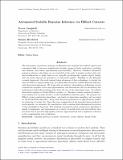Automated Scalable Bayesian Inference via Hilbert Coresets
Author(s)
Campbell, Trevor David; Broderick, Tamara A
DownloadPublished version (7.184Mb)
Publisher with Creative Commons License
Publisher with Creative Commons License
Creative Commons Attribution
Terms of use
Metadata
Show full item recordAbstract
The automation of posterior inference in Bayesian data analysis has enabled experts and nonexperts alike to use more sophisticated models, engage in faster exploratory modeling and analysis, and ensure experimental reproducibility. However, standard automated posterior inference algorithms are not tractable at the scale of massive modern data sets, and modifications to make them so are typically model-specific, require expert tuning, and can break theoretical guarantees on inferential quality. Building on the Bayesian coresets framework, this work instead takes advantage of data redundancy to shrink the data set itself as a preprocessing step, providing fully-automated, scalable Bayesian inference with theoretical guarantees. We begin with an intuitive reformulation of Bayesian coreset construction as sparse vector sum approximation, and demonstrate that its automation and performance-based shortcomings arise from the use of the supremum norm. To address these shortcomings we develop Hilbert coresets, i.e., Bayesian coresets constructed under a norm induced by an inner-product on the log-likelihood function space. We propose two Hilbert coreset construction algorithms|one based on importance sampling, and one based on the Frank-Wolfe algorithm|along with theoretical guarantees on approximation quality as a function of coreset size. Since the exact computation of the proposed inner-products is model-specific, we automate the construction with a random finite-dimensional projection of the log-likelihood functions. The resulting automated coreset construction algorithm is simple to implement, and experiments on a variety of models with real and synthetic data sets show that it provides high-quality posterior approximations and a significant reduction in the computational cost of inference.
Date issued
2019-02Department
Massachusetts Institute of Technology. Computer Science and Artificial Intelligence Laboratory; Massachusetts Institute of Technology. Department of Electrical Engineering and Computer ScienceJournal
Journal of Machine Learning Research
Publisher
MIT Press
Citation
Campbell, Trevor and Tamara Broderick. “Automated Scalable Bayesian Inference via Hilbert Coresets.” Journal of Machine Learning Research, 20 (February 2019): 1-38 © 2019 The Author(s)
Version: Final published version
ISSN
1533-7928
1532-4435